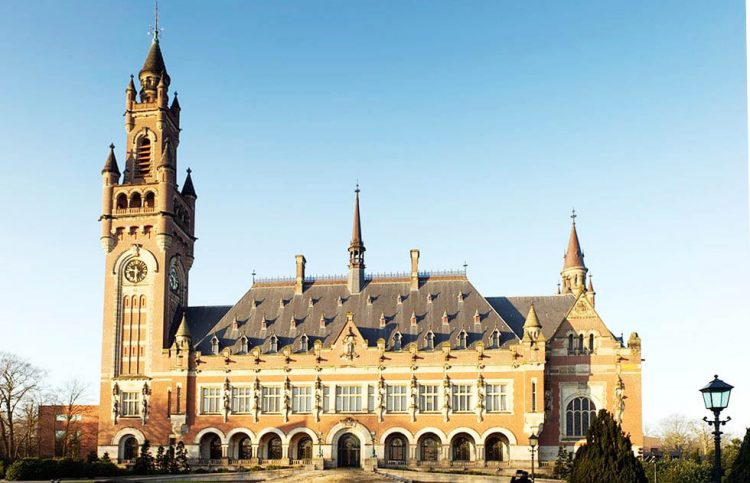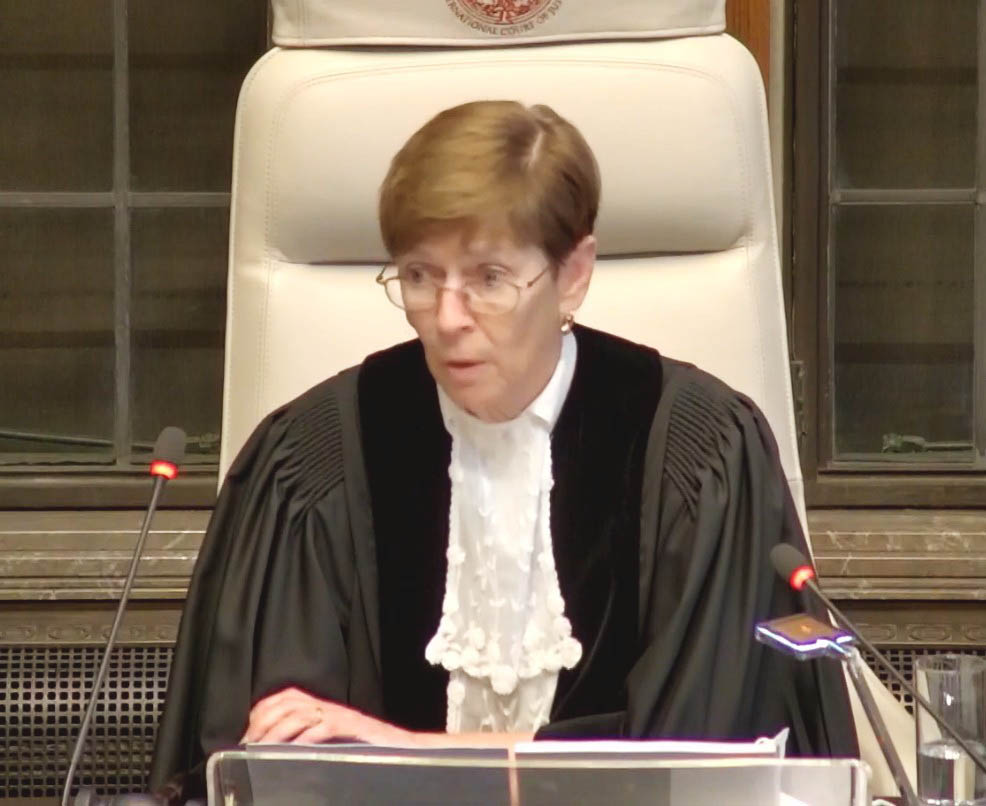By Femi Harris-Smith
The International Court of Justice (ICJ) yesterday ruled in Guyana’s favour that its case before it seeking to affirm the validity of the 1899 Arbitral Award settling the boundaries between it and Venezuela is admissible; and that the United Kingdom has no place in the proceedings as Caracas has sought to argue.
What this means, is that the Netherlands-based Court can move forward with hearing the substantive case on its merits, of whether the 1899 arbitral award settling the boundaries of Guyana and Venezuela is valid and binding.
The decision has been hailed by both Government and the main APNU+AFC opposition.

President Irfaan Ali was swift to note that the ruling is the second time that the international court has rejected jurisdictional objections raised by Venezuela; while stating that “Guyana remains confident that its longstanding international boundary with Venezuela will be confirmed by the Court.”
Opposition spokesperson on Foreign Affairs and Member of Parliament Amanza Walton-Desir, said that “the APNU+AFC stands with the Government and people of Guyana in welcoming the decision;” even as she noted that the way has now been cleared for the World Court to adjudicate on the merits of the case, “in pursuit of a final and binding judgment on the matter.”
In delivering the 14 to 1 ruling yesterday, the World Court—the principal judicial organ of the United Nations—for settling such controversies among contracting States, said among other things that contrary to Venezuela’s position, the United Kingdom has no place in the proceedings.
In fact, President of the Court, Joan E. Donoghue, who read the ruling, said that Articles 2 and 4 of the Geneva Agreement of February 17, 1966 to initiate a process for satisfactory solutions to the border controversy makes it clear that the parties were British Guiana and Venezuela only.
In March 2018, Guyana filed its application with the ICJ to confirm the validity and binding effect of the Arbitral Award of 3rd October, 1899 on the boundary between the two countries and the subsequent 1905 agreement, following the decision by the UN Secretary-General Antonio Guterres to choose the ICJ as the next means of resolving the controversy which stems from Venezuela’s contention that the award was null and void.
On 7th June 2022, the Bolivarian Republic of Venezuela had raised preliminary objections to the admissibility of the case before the Court, contending that the United Kingdom is an indispensable third party, and the matter should therefore not be allowed to proceed in its absence.
Guyana had argued through its battery of international lawyers, however, that the United Kingdom is not indispensable since it has no legal interests that would be affected by a judgment on the validity of the Arbitral Award which fixed the boundary between then British Guiana and Venezuela, or any interests in the boundary itself.
Such interests having terminated in May of 1966, upon Guyana’s independence.
In rejecting Venezuela’s claims that the United Kingdom ought to be a party to the proceedings, the Court was keen to point out that the Geneva Agreement firstly provided for the establishment of a Mixed Commission aimed at resolving the controversy.
That Commission comprised representatives appointed by the Government of British Guiana and the Government of Venezuela, to seek a settlement of the controversy between the parties as provided for in Articles I and II.
Justice Donoghue said that while the Court observes that Article I of the Agreement describes the controversy as one existing between the United Kingdom and Venezuela, Article II provides “no role for the United Kingdom in the initial stage of the dispute settlement process.”
Rather, she said it places the responsibility for appointment of the representatives to the Mixed Commission on British Guiana and Venezuela.
The Court went on to note that the reference to “British Guiana” contained in Article II, which can be distinguished from references to the “United Kingdom” contained elsewhere in the treaty and particularly in Article I, supports the interpretation that the parties to the Geneva Agreement “intended for Venezuela and British Guiana to have the sole role in the settlement” of the controversy through the mechanism of the Mixed Commission.
Particularly, she said it is noteworthy that such an understanding was arrived at, notwithstanding that British Guiana was a colony which had not yet attained independence and was not yet a party to the treaty.
The Court noted that neither paragraph 1 nor 2 of Article IV of the Geneva Agreement contains any reference to the United Kingdom; further pointing out that in the process for the settlement of the controversy, reference is made only to the Governments of Guyana and Venezuela, and place upon them the responsibility to choose a means of peaceful settlement as provided in Article 33 of the Charter of the United Nations or; failing agreement on such means, the responsibility to refer the decision on the means to an appropriate international organ upon which they both agree.
Failing agreement on that point, the Parties would refer the matter to the Secretary-General of the United Nations who would choose one of the means of settlement provided in Article 33 of the Charter of the United Nations.
Interpreting
Justice Donoghue said that interpreting paragraphs 1 and 2 of Article IV of the Geneva Agreement in accordance with the ordinary meaning to be given to the terms in their context, and in the light of the Agreement’s object and purpose, the Court concludes that the Geneva Agreement specifies particular roles for Guyana and Venezuela and that its provisions, including Article VIII, do not provide a role for the United Kingdom in choosing, or in participating in, the means of settlement of the dispute pursuant to Article IV.
Against this background, the Court said it considers that the scheme established by Articles II and IV of the Geneva Agreement reflects a common understanding of all parties to that Agreement that the controversy would be settled by Guyana and Venezuela through one of the dispute settlement procedures envisaged in the Agreement.
To further solidify its ruling that the United Kingdom has no place in the proceedings before it, the World Court also made reference to the 11th meeting of the Mixed Commission at which a practical settlement of the controversy was being sought.
The Court then noted its observation that the United Kingdom did not seek to participate therein; nor did Venezuela and Guyana request its participation. “Venezuela’s exclusive engagement with the Government of Guyana at the Mixed Commission indicates that there was a common understanding among the parties that Article II did not provide a role for the United Kingdom in the dispute settlement process,” the Court declared.
The Court in its ruling stated clearly that the practice of the parties to the Geneva Agreement further demonstrates their agreement that the dispute could be settled without the involvement of the United Kingdom.
Against this background, the Court in its majority judgment of 14 to 1, concluded that, by virtue of being a party to the Geneva Agreement, the United Kingdom accepted that the controversy between Guyana and Venezuela could be settled by one of the means set out in Article 33 of the Charter of the United Nations, and that it would have no role in that procedure.
President Ali in the statement following the ruling said that Guyana has always been fully committed to the peaceful resolution of the controversy with its neighbour and sister Republic in accordance with international law.
The Guyanese Head of State said “that is why, after attempting unsuccessfully to achieve a diplomatic settlement through talks mediated by the United Nations Secretary-General over more than two decades, Guyana brought the matter to the International Court of Justice for a final and binding determination.”
All Member States of the United Nations, including Guyana and Venezuela, are obligated under the United Nations Charter to comply with the Court’s binding judgments, he noted.
Ali then said he wanted to thank Guyana’s legal team, its Agent, all stakeholders, and every Guyanese “for the continued commitment and outstanding work as we proceed with this matter in the International Court of Justice.”
The cadre of international lawyers representing Guyana included Pierre d’Argent, Paul S. Reichler, Philippe Sands and Christina L. Beharry; along with Agent of the State, Carl B. Greenidge and other high-level government officials.
Reuters yesterday said that responding to the ICJ ruling, Venezuelan Vice-President Delcy Rodriguez said that negotiations are the only way to reach a “practical and satisfactory” solution.
President Nicolas Maduro and his government will exhaustively evaluate implications of the ruling, she added, and “adopt all the measures available for the defense of its legitimate rights and territorial integrity.”
Background
In its Application of March 29th, 2018 before the ICJ, Guyana requested that the Court adjudge and declare that:
“(a) The 1899 Award is valid and binding upon Guyana and Venezuela, and the boundary established by that Award and the 1905 Agreement is valid and binding upon Guyana and Venezuela;
(b) Guyana enjoys full sovereignty over the territory between the Essequibo River and the boundary established by the 1899 Award and the 1905 Agreement, and Venezuela enjoys full sovereignty over the territory west of that boundary; Guyana and Venezuela are under an obligation to fully respect each other’s sovereignty and territorial integrity in accordance with the boundary established by the 1899 Award and the 1905 Agreement;
(c) Venezuela shall immediately withdraw from and cease its occupation of the eastern half of the Island of Ankoko, and each and every other territory which is recognized as Guyana’s sovereign territory in accordance with the 1899 Award and 1905 Agreement;
(d) Venezuela shall refrain from threatening or using force against any person and/or company licensed by Guyana or engage in economic or commercial activity in Guyanese territory as determined by the 1899 Award and 1905 Agreement, or in any maritime areas appurtenant to such territory over which Guyana has sovereignty or exercises sovereign rights, and shall not interfere with any Guyanese or Guyanese-authorised activities in those areas;
(e) Venezuela is internationally responsible for violations of Guyana’s sovereignty and sovereign rights, and for all injuries suffered by Guyana as a consequence.”
Guyana’s recourse to the ICJ came after decades of stalemate in its border controversy with Venezuela. While Venezuela had said it was not participating in the process, it was a part of the case management process. Its Vice President Rodríguez had told the ICJ that her country’s participation was “as a courtesy, not as a party in this procedure.”
On 7 June 2022, however, Caracas joined the proceedings when it raised the preliminary objections to the admissibility of the case before the Court. Hearings on this matter were heard by the ICJ in November last year. Lawyers presented arguments for Guyana and Venezuela over several days.






